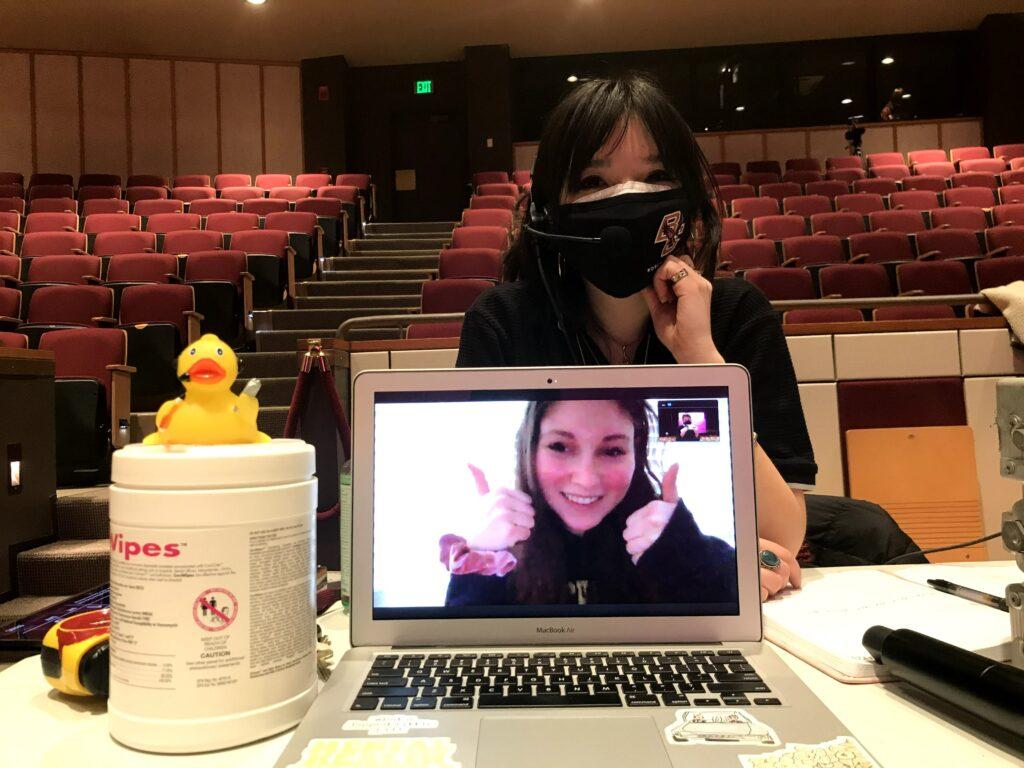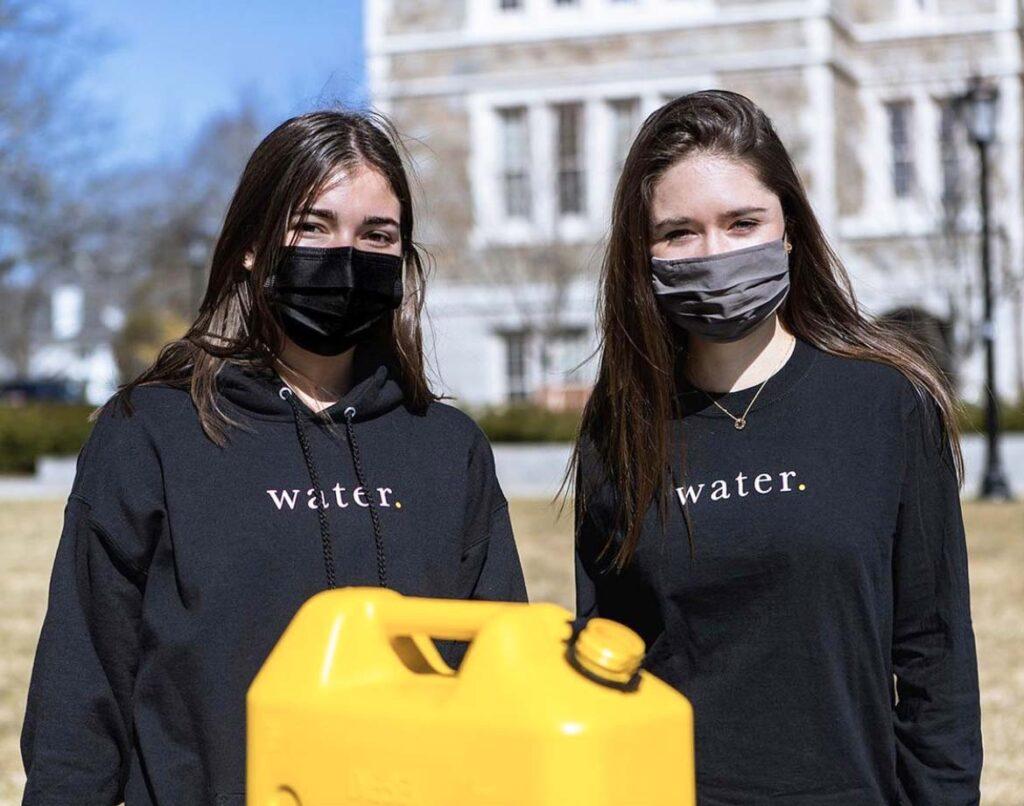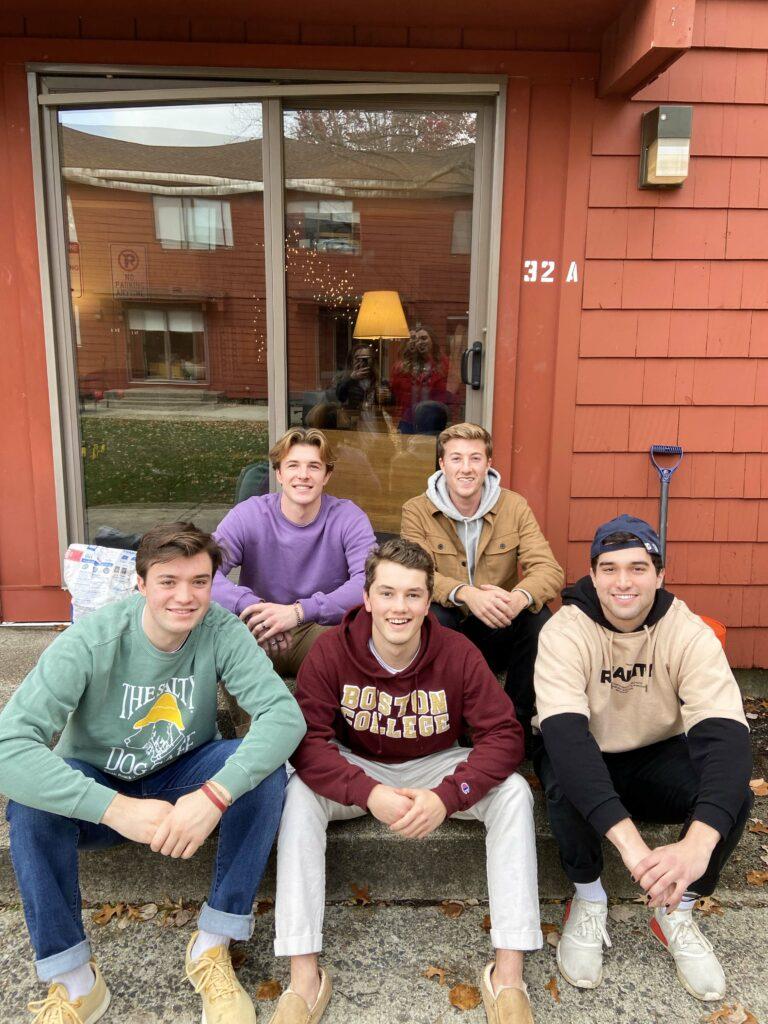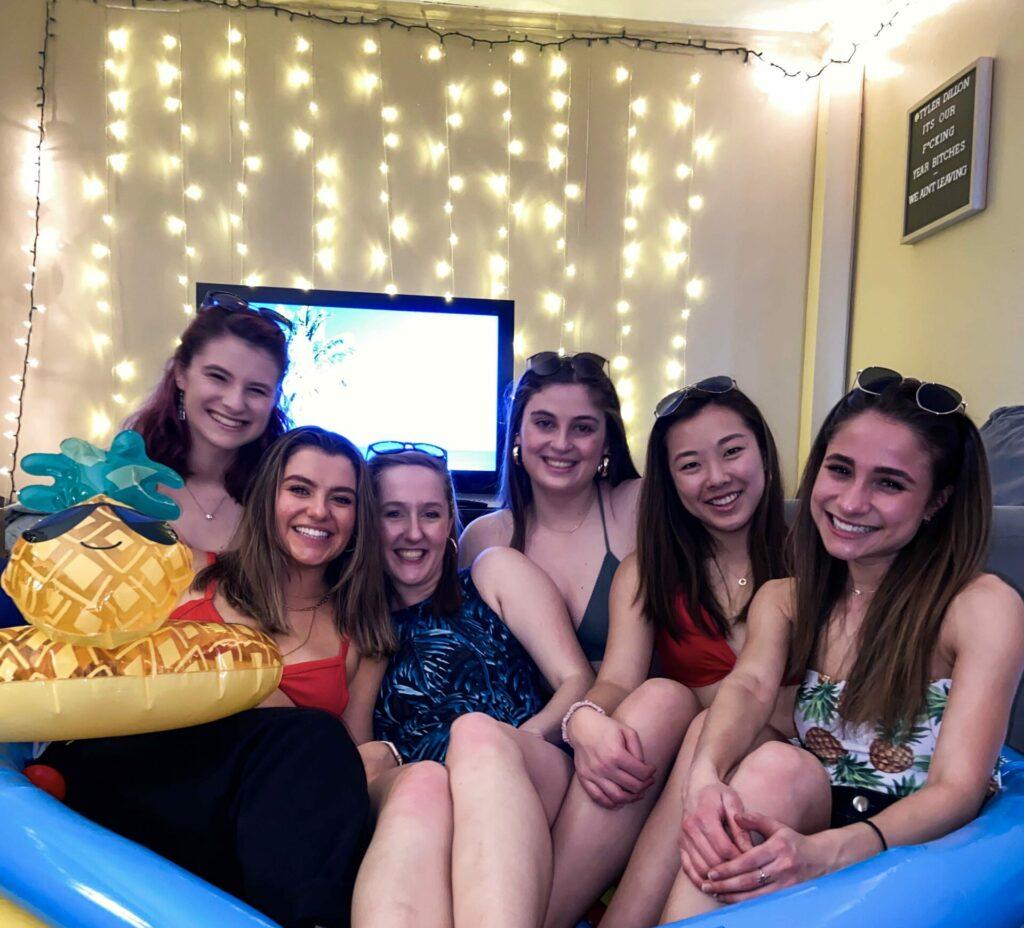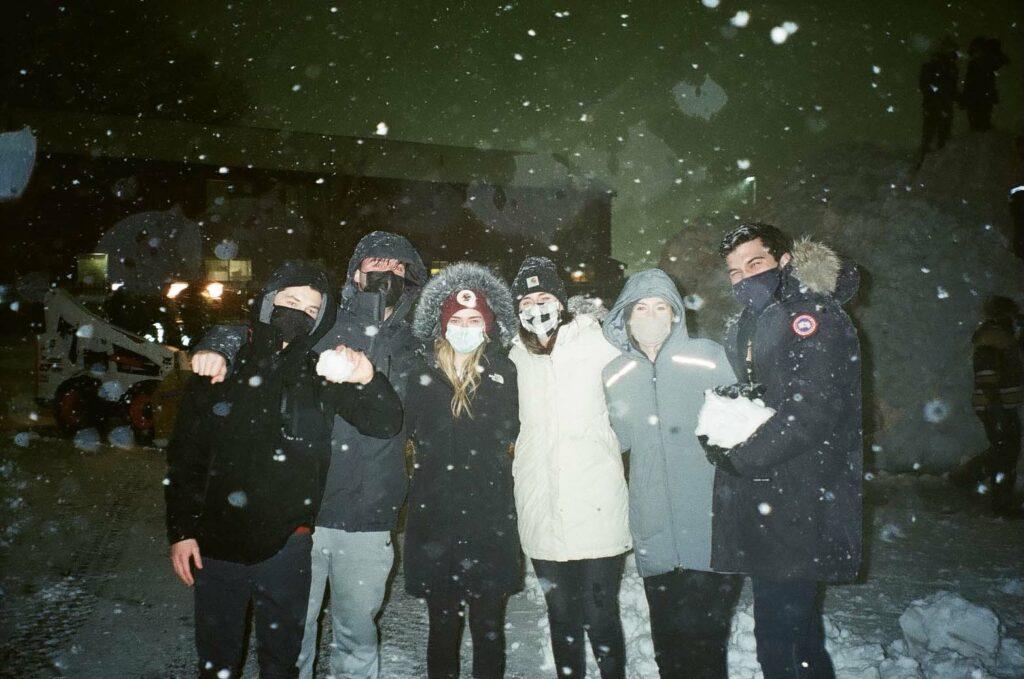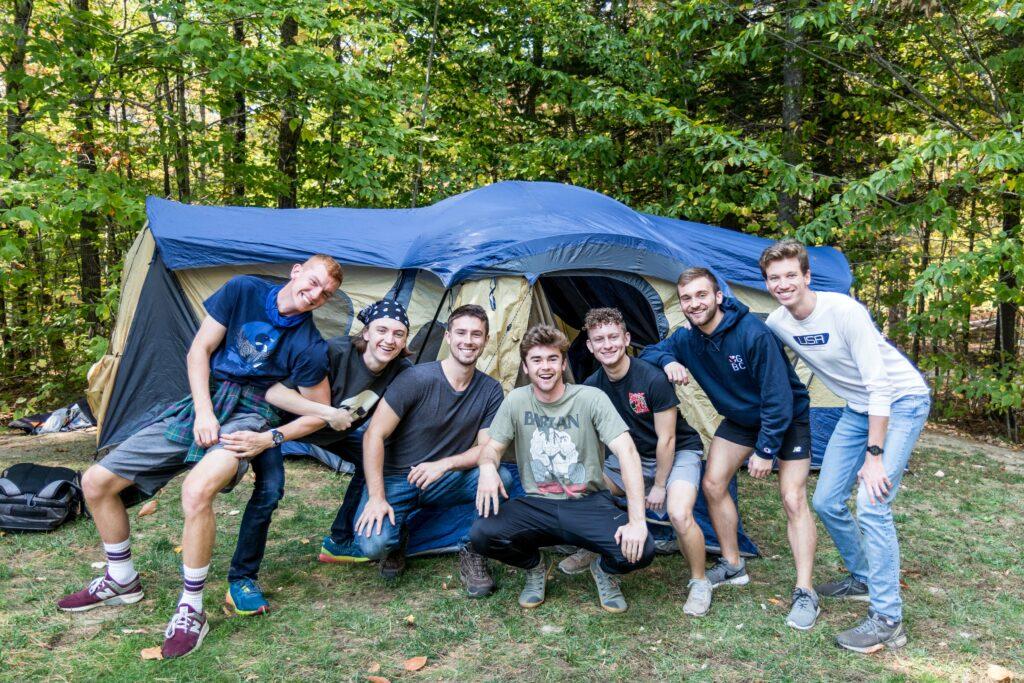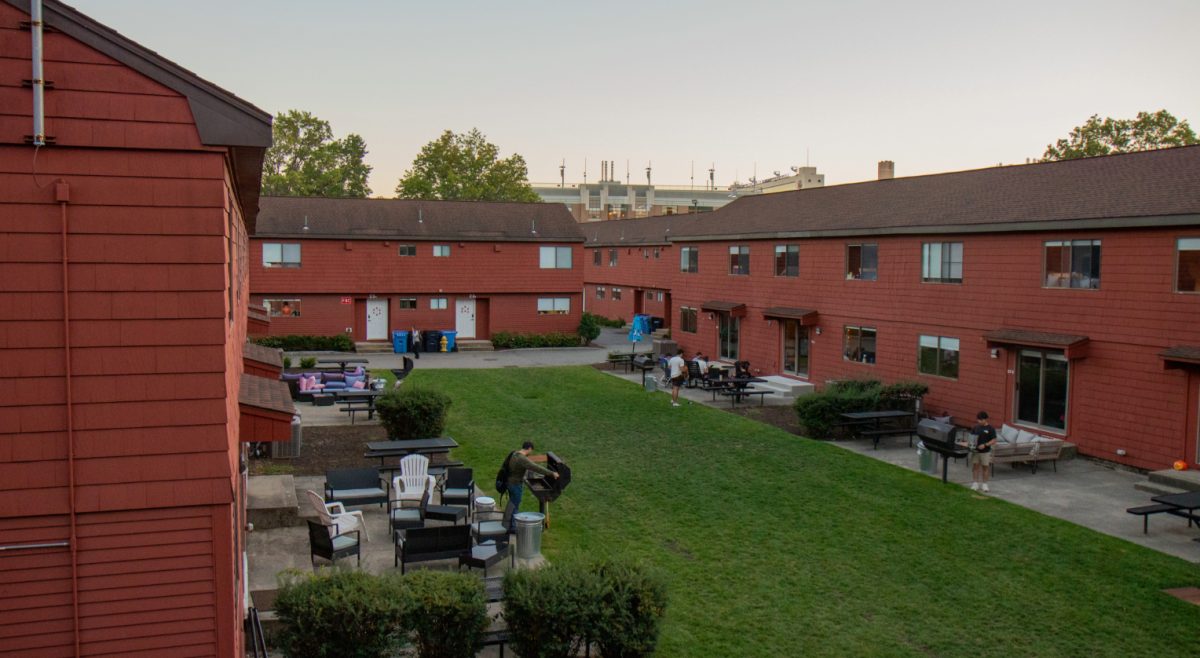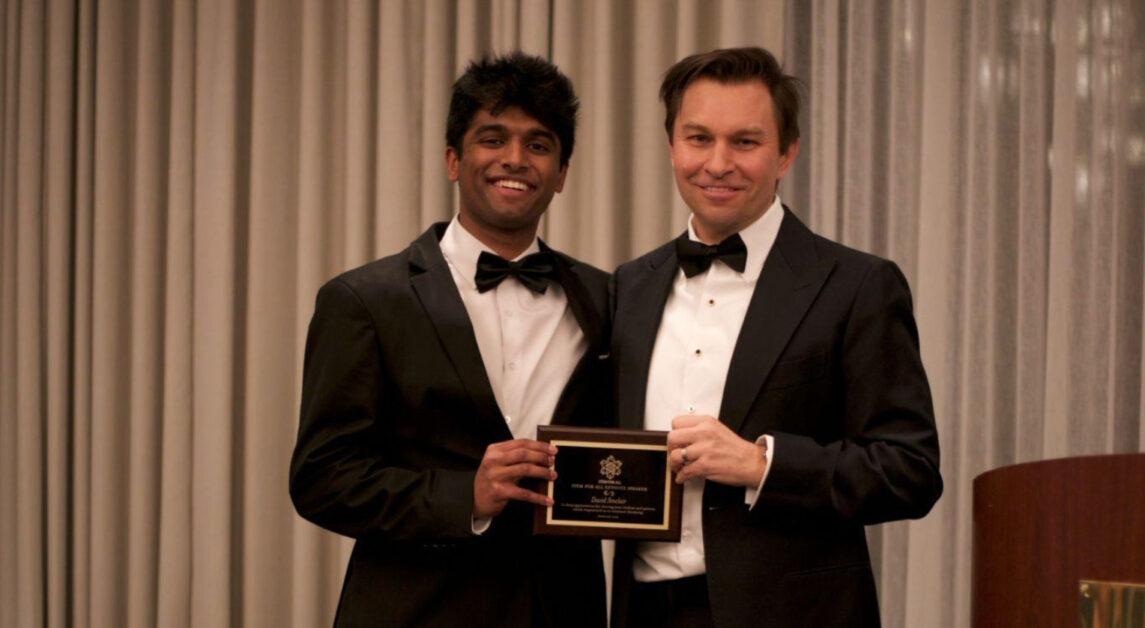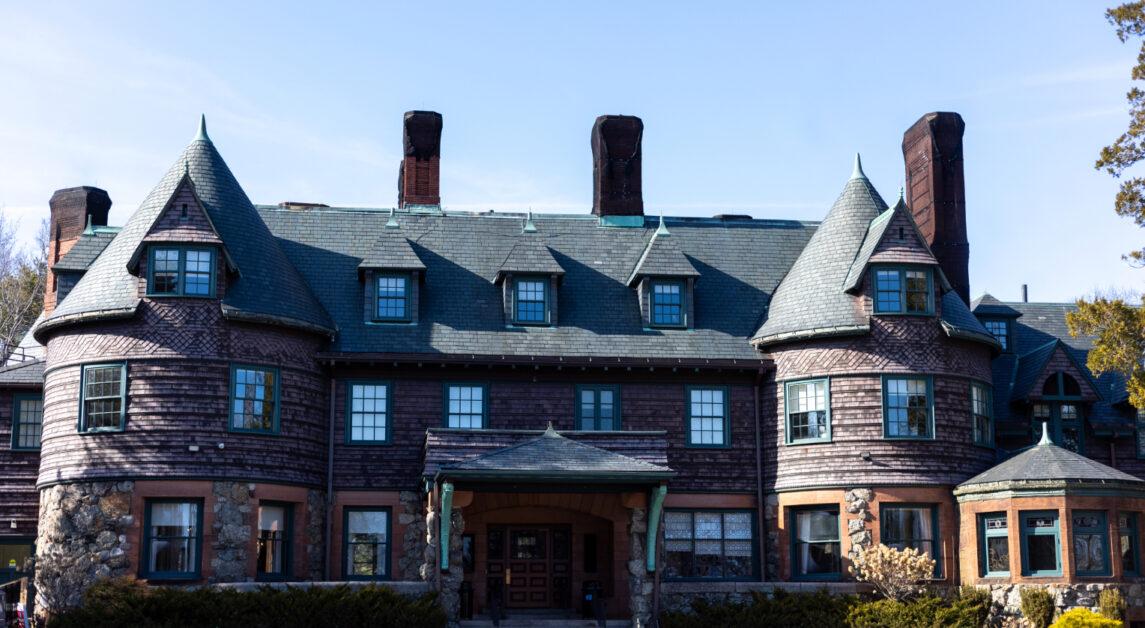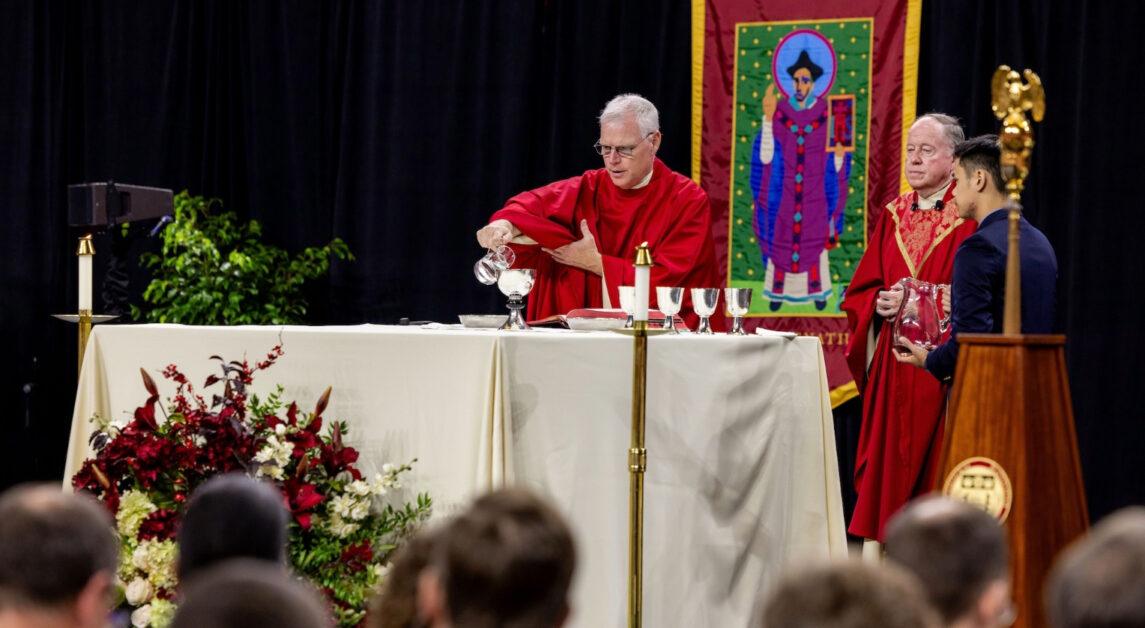For the past three years at Boston College, Megan Kern has lived in the fast lane, she said. Like many BC students, she sacrificed sleep and time with friends in order to take on more, both academically and extracurricularly.
But when COVID-19 struck the United States in March of 2020, Kern, Lynch ’21, was forced to accept that she had to slow down. Now, as she goes about her daily habit of writing down her favorite parts of each day, her perspective on what she values has shifted.
Although Kern was not able to have a “normal” senior year, the lessons she learned are something that she will carry with her in the future, she said.
Similarly, many seniors had to cope with the loss of what would have been the culmination of their BC experience—senior year and the traditions that come with it. Though traditions such as Mod weddings, Senior Week, and Commencement may not exist in their typical forms, many seniors have said this past year on the Heights has provided unique opportunities for learning and personal growth.
COPING WITH THE UNKNOWN
After BC students were sent home last March due to COVID-19, many current seniors said they struggled to imagine what it would be like to return to a modified campus. With so many unknowns surrounding the return to campus for the fall semester, current seniors experienced a range of emotions.
“I think things came in waves—kind of like a grieving process,” Tatiana Niebuhr, MCAS ’21, said. “I knew deep down already that my senior year was not gonna look like the way that I wanted it to or the way that we were promised to have our senior year look like.”
As the pandemic continued, current seniors became increasingly aware that things were not going to return to normal for some time.
“So, like, right when the pandemic hit we were like, ‘Oh, we’ll see you next year at the tailgate and the football game,’” Czar Sepe, MCAS ’21, said. “I mean, it was stupid, but, like, we kind of didn’t know yet.”
As the spring progressed, students became nervous about BC’s ability to reopen in light of other universities across the country announcing plans to operate remotely Ellie Rueve, MCAS ’21, said.
On May 19, 2020, University President Rev. William P. Leahy, S.J., announced that students would be allowed to return to campus and classes would resume on Aug. 31.
“I was like, ‘Awesome, but, like, at what cost? Like, what capacity?’” Kaitlin McCarthy, MCAS ’21, said. “I think like all summer, I was just kind of really nervous about going back and being here and what that would look like.”
After this news, a summer full of anticipation of updates from the BC administration about reopening plans ensued—in addition to the growing acceptance that senior year would not look the same.
“So I knew, okay, well … my senior year isn’t gonna look like my junior year,” Niebuhr said. “I had to deal with the ambiguity and wait and see. And I knew that it was difficult for a lot of my friends and colleagues as well because we wanted to see what our senior year was going to look like and have a lot of those memorable moments.”
SHIFTING TO THE NEW NORMAL
After three years of growing accustomed to their extracurriculars, many seniors spearheaded shifts to enable their clubs and groups to operate during the pandemic.
Stemming from BC’s Jesuit tradition, the University’s wide-ranging service groups are incredibly popular. Most rely on in-person trips or weekly service outings, which became difficult to continue due to COVID-19.
Through Appa Volunteers, students typically go on trips across the United States during Spring Break. When it became clear that this would not be possible, however, Appa leaders had to look critically at their mission, according to Kern, an Appa student leader.
Instead of planning for their usual trip, Appa spent the fall semester engaging in seminars on topics ranging from race to housing insecurity to education, both nationwide and locally. Then, in the spring, groups were able to go on local service retreats, such as to the Centre Street Food Pantry in Newton, Mass., where Kern’s group went.
“In Appa, we always talk about Appa and beyond, meaning … we’re not just doing a week of service … we’re bringing the spirit of Appa,” Kern said. “It was really cool because … in Newton, it was like a mile and a half walk … this is something I can do regularly, and it kind of gave me the sense of, it gave me a bigger motivation to do what I can.”
Cole Hammers, CSOM ’21, said that his disappointment in not being able to attend his last Appa trip was minimized by his choice to apply to be a Kairos leader. Hammers hadn’t attended a Kairos retreat since his senior year of high school, he said, so attending one as a senior in college allowed him to go deeper into reflection.
“The emotions were just like so positive,” Hammers said. “It felt like, kind of, an environment that COVID couldn’t really change.”
McCarthy also had to lead shifts as a 4Boston leader. One of the most challenging parts, she said, has been fostering space for reflection without the same in-person abilities.
“It’s been so hard to even just like book rooms for clubs to meet in person and … to, like, still foster these in person interactions, … those sorts of things that BC really thrives on,” McCarthy said.
Musical groups have also struggled to adapt to COVID-19 protocols. The University Chorale of Boston College had to go completely remote, Niebuhr said.
“Singing is really tricky,” Niebuhr said. “You’re breathing on people. I’m really impressed and really happy with how things have gone with Chorale, but in the fall, … I was very concerned that, you know, having rehearsals over Zoom was going to be very unfulfilling.”
Niebuhr is also in the Boston College Symphony Orchestra, which faced a similar struggle of relying on in-person rehearsals and performances but not being able to accommodate wearing masks. Last summer was spent communicating with the University on how the orchestra could rehearse, eventually landing on a hybrid format where musicians could record in a physically distanced setup in Gasson Hall.
Despite missing the benefits of live performance, Niebuhr said that an upside to recording the music is being able to widely distribute it.
“I think the benefit that I didn’t see when we initially came up with this idea, but I’m now seeing, you know, coming up on Arts Fest, and we’re going to be showing this off to everybody is that now all of our work is immortalized,” Niebuhr said.
For Olivia Constantino, MCAS ’21, the biggest loss was not being able to fulfill her role as student performer for Pops on the Heights in person because the event was moved online. Although Constantino can’t reconcile the loss of the in-person performance, she has also seen the broader benefits of recording events, she said.
Theatre—another large performing arts presence on campus—has struggled to adapt to pandemic protocols. In-person performances have been limited, but in one show directed by Allison Lardner, Lynch ’21, cast members could only touch if wearing gloves.
“I think a lot of us are trying to kind of embrace what technology and what Zoom can do for what storytelling is, but of course, you know, there’s nothing like being on a stage and being with your castmates,” Lardner said. “I think the word of this year for me has been ‘compromised.’”
Other performing arts groups, such as Asinine Sketch and Improv Comedy, have also had to sacrifice normal live performances because of the pandemic. Brendan Barnard, MCAS ’21, and Hammers have both been involved in Asinine since their freshman year. Barnard, current Asinine co-president, said he has missed being able to perform live.
Certain groups, including BC’s peer support network Lean On Me, have experienced a surge in workload as a result of the pandemic, according to Lardner, chapter coordinator for the club. Lean On Me was already online-based, but its functionings, such as staff trainings, have now become entirely remote as well.
“Lean On Me is a virtual system, you know, it doesn’t matter where you are on campus, or if you’re taking classes from home, from Arizona, from California, whatever, you can still text into the hotline, and you can still get support,” Lardner said. “Our basic functioning has not changed … it’s just intensified with everything that’s been going on COVID wise, race-relations wise, uncertainty wise, academics, relationships, etc.”
The pandemic posed many challenges to seniors’ extracurricular involvements that have been foundational to their four years at BC, but it also provided them with new opportunities for growth.
Mary Kate Viceconte, co-president of Women in Business (WIB) and CSOM ’21, said that she had to look at what events were the most successful in the past and determine how she could effectively transition these events online. One such event, the monthly WIB town hall meeting that brings in guest speakers, benefited from being virtual.
“The great thing about having this transition online is that we actually had more access to really cool speakers that we wouldn’t have had otherwise,” Viceconte said. “We interviewed a blogger, Freckled Foodie, we interviewed the TikToker Galey Alix, [and] we interviewed Bennett from The Bachelorette, which was our most attended event. That really helped to draw people in because I think when you … see a big name … you feel less, like, ‘Oh what am I going to talk about?’”
Another new initiative Viceconte led for WIB is a mentorship program between female seniors in the Carroll School of Management and female CSOM professors, which she said was inspired by the fact that hybrid and remote learning has made student-to-faculty connections more difficult.
Working alongside WIB’s adviser and Director of Carroll School Undergraduate Assurance of Learning Dianne Feldman, Viceconte matched 14 professors with three to four seniors each, who met over the course of this semester.
“It’s like, ‘How can I leverage our network and our community … and create meaningful conversation that students are going to be able to take with them post Boston College?’” Viceconte said.
Similarly, despite the challenges of having limited in-person events, charity: water has achieved record successes in terms of fundraising, partly because of the possibilities created by Zoom, according to Rueve, charity: water co-president.
This year’s Portico book for CSOM freshmen was Thirst: A Story of Redemption, Compassion, and a Mission to Bring Clean Water to the World, which was co-written by charity: water founder Scott Harrison and Lisa Sweetingham. Since CSOM mainly hosted guest speakers remotely due to COVID-19, Harrison was able to speak to CSOM freshmen via Zoom, Rueve said.
Because Harrison’s talk brought increased awareness to charity: water, the organization has been able to ramp up normal fundraising activities and spread awareness on social media. As a result, charity: water raised $10,000 in the fall semester.
“Our goal since our freshman year has been to raise $10,000 … because $10,000 is enough to fund a water project, and that’s just something that hasn’t been done since I think maybe the first year charity: water became a club,” Rueve said.
After hitting their first goal within the first semester, charity: water decided to continue dreaming big, Rueve said, and upped their goal to $20,000—which they again hit.
NEW ENDEAVORS
With many events canceled and people confined to their houses, quarantine provided a surplus of free time, of which some seniors took advantage.
After seeing high school Class of 2020 yard signs scattered across his neighborhood, Sepe came up with the idea to create Parsippany College Connect, an online service that connects high school students in Parsippany, N.J., with current college students.
Parsippany College Connect’s specific goal is to foster connections and build a community between current high school and college students in order to foster a smoother transition to college, Sepe said. The company has utilized social media to expand and has hosted Zoom meetings to open dialogues between high schoolers and college panelists, and it has been able to raise money to give two scholarships to high school students.
“That kind of hit home to me,” he said. “I was like, ‘Wow, this is a really tangible thing that I’ve done, that we’ve all done, you know, in the midst of this pandemic.’ And for me, that gave me a lot of pride, but also it felt rewarding.”
Other BC seniors took the opportunity to get involved with on-campus organizations when they returned to campus last semester. McCarthy began writing for The Gavel and got a job working at the Margot Connell Recreation Center.
“I did join The Gavel, which has been really fun,” she said. “I had a little more extra time, and I started working in the gym. … I, like, enforce COVID protocol, [so] there are people who probably hate me. I tell them to keep their masks on, but I’m keeping this campus safe.”
Apart from finding new organizations and clubs, one group of seniors has added a sense of fun to their senior year in a unique way—a dare jar.
Barnard, Hammers, and their fellow Mod residents found themselves bored one night before the spring semester started, so they wrote a bunch of dares on pieces of paper and put them in a jar, creating a game out of it. Each of the players had to film themselves doing the dares to prove they completed them.
When Joseph Porpora, MCAS ’21, returned to campus for the spring semester, he thought it would be a good idea to document the dare jar on TikTok.
What began as a simple solution to momentary boredom has turned into social media fame.
Porpora posts each week’s compilation of dares on his TikTok account, which has amassed over 130,000 followers and over 2.2 million likes at the time of publication.
Some dares include brushing your teeth for 30 seconds while on a Zoom class, doing a flash mob somewhere on campus, and setting up a lemonade stand on the Quad.
“I was doing a dare the other week where I had to set up a lemonade stand on the Quad, and a bunch of people came up and knew right away—they were asking me if it was for the TikTok,” Barnard said. “And then a bunch of, like, people in classes have mentioned that they’ve seen me on their For You page on TikTok, so it’s kind of funny to have a weird little bit of recognition.”
Barnard said that this weekly tradition has added creativity and laughter into their lives and that it will be the first thing that comes to his mind in the future when he looks back on his senior year.
For Porpora, having the dare jar and the TikTok account go viral has helped him and his friends make the most of their limited time left at BC, despite the abnormal circumstances, he said.
“Having these memories we have now of just embarrassing ourselves across BC’s campus is something I will take away, just that we’re getting the most out of the circumstances we’re in,” he said. “So, I’ll always remember that.”
PRESERVING TRADITIONS
Unchanging circumstances left seniors with no choice other than to accept that they would not get the same senior year that those who came before them did. Instead of feeling defeated, though, this year has been centered around attempting to still celebrate the special moments of senior year in modified fashion, according to Rueve.
“I think [that] our theme for the year is … it’s not going to be able to happen and don’t just like sit around and cry about it, but instead … either try and mimic it or just like have a positive attitude because that’s all you can do,” Rueve said.
Game days in the Mods were some of the most apparent examples of the unusualness of the past two semesters. With tailgates prohibited and BC football playing without spectators, the Mods were eerily quiet on game days. Even so, seniors took advantage of the coveted outdoor space of the Mods.
Mod residents Barnard, Hammers, and Porpora said they believe that one of the best parts about living in the Mods—especially during the pandemic— has been having a yard.
“The reason people want to have [a Mod] is … you get to throw crazy parties, and that’s obviously not a part of this year, but I think having a backyard, … having just like fresh light and air, and having the ability to just go outside is, now more than ever, just a great thing to have,” Porpora said.
Hammers said this benefit of the Mods was at its peak during the warmer weekends of this year.
“The first four weeks were incredible,” he said. “Just, like, people [were] outside, you know, [I] cooked most of my meals on the grill. It was really nice. We got a volleyball net too, so we play that a ton. … I think the COVID stuff is a little easier to stomach when you can be outside.”
As a way to incorporate normal traditions into this unconventional year, Hammers said something he and his friends plan on doing is the drink-the-dorms tradition, where seniors visit and drink with the current residents of their past dorm rooms and off-campus houses or apartments.
Despite the sense of loss surrounding BC traditions like tailgating on game days, seniors still found new and COVID-19-safe ways to embrace BC traditions.
“We would go to … Tavern in the Square, and we do all the chants, and it just sounded really absurd, especially if there wasn’t as high of a BC crowd turnout in the restaurant,” Sepe said. “Even when you’re just sitting in a restaurant with like six people, it was really fun and we kind of kept that spirit.”
For Rueve, who has cousins that have played for BC and one who is a current freshman on the team, football has been an integral part of the BC experience, making its loss one of the most disappointing parts of the year.
“My roommates noticed that that was something I was sad about, and the first tailgate day they got a bunch of like chips and dips and like decorated our room, like ‘Happy game, Ellie’ so that was something that was really special and we just watched the game on our TV,” Rueve said.
The transition to being on a campus full of people but being restricted in terms of who you can see has been the most difficult aspect of this year, Niebuhr said. Staying in touch with friends outside of one’s close circles has been challenging, Sepe said.
“Even if we’re at a big tailgate, you know you’d always see someone that … you’re not, like, too close with them, but you always say hi to them,” Sepe said. “I felt that kind of the friends that were on the periphery … kind of like fell to the wayside.”
Above all, McCarthy said that she and her friends will continue to preserve traditions as much as possible through the end of the year, in order to feel the sense of celebration that is so integral to senior year.
“I don’t really know what Senior Week’s gonna look like, but … we’re all planning on, even just hosting a Commencement Ball among ourselves and, like, wearing old prom dresses and trying to, you know … go into Boston in ball gowns just for fun, and just do our thing, trying to make the most,” McCarthy said.
SILVER LININGS
At the expense of having to limit social circles, seniors have gotten to spend increased time with their roommates, whether sitting next to each other during Zoom classes or cooking lunch together, Kern said.
McCarthy also said that the moments spent with her roommates and friends helped establish a sense of community and togetherness.
“I think I’ll always look back on this year as being, like, weird but still good,” McCarthy said. “It’s still senior year, you know. … [It’s] the times, like, grilling in the Mods with my roommates or Res walks with friends and [going] to White Mountain like three days a week. … It’s the little things and just being around here on this campus.”
Alongside cherishing the little moments, planning outings and other things to get excited about have also helped encourage Kern to try new things and remain hopeful, she said.
“We’ll plan things, like one day we went biking on the Bluebikes into the city or one day we went hiking,” Kern said. “I feel like how I’ve been remaining optimistic is to make little plans for myself to do something different, not just what I’m doing every single day.”
As the spring semester progresses, the increasing number of students getting vaccinated has also fostered a sense of hope among seniors for the return to “normal life.”
“I got my first shot of the vaccine … in early April,” Sepe said. “I was like, ‘Wow, it feels like, it’s like there is hope.’ … How does this happen [in] less than a year? Like, that’s insane. … I marvel at that. I’ll always remember that, and it’s one of those stories you’ll probably tell your grandkids.”
Other seniors recognize the efforts of student organizations, such as the Undergraduate Government of Boston College, which has been working to host more in-person events in the spring semester.
“I went [to] Equinox, and that was the most normal-feeling event I’ve been to in a year and a half,” Jessica Thalheimer, CSOM ’21, said. “I also like the BC After Dark. That’s pretty cool how they’re serving food and alcohol on campus now, so I feel like BC is really making an effort for the students to have fun.”
Giancarlo Isotti, CSOM ’21, director of the Mentorship Programming Team (MPT) for the Campus Activities Board (CAB), said that COVID-19 adds a layer to the already difficult task of event planning.
Not only has CAB had to think about the normal aspects of event planning—such as making the events accessible to everyone, marketing the events, and planning other logistics—but it has also needed to monitor students keeping their masks on, sanitizing their hands, and limiting close contact with their peers at events.
Though CAB has undergone many changes, Isotti said that the club has been one of the highlights of and added a sense of normalcy to his senior year.
“I think almost everything about college has changed, and classes are different, and hanging out with friends is a lot different, going out is much different, but the Campus Activities Board spirit has still remained the same,” he said.
In running MPT—CAB’s freshmen introduction program—this year, Isotti said he enjoyed meeting the freshmen and building a new BC community alongside them, he said.
“[I’m] a senior in the Campus Activities Board, I’ve been doing this for four years now,” he said. “And to kind of walk with the freshmen through this experience of, like, creating a new Boston College experience, I think it’s almost like a full reset in a way.”
FINAL REFLECTIONS
Despite the disappointments this year has wrought, seniors have found solidarity and comfort within their communities.
With COVID-19 vaccines now open to all adults in the United States, a sense of normalcy seems to be returning. Although the Class of 2021 will not be able to experience a “normal” BC as students again, many seniors said they have hope that next year, underclassmen—especially current freshmen—will enjoy the typical BC traditions.
“I have hope for, you know, years of BC ahead and I hope that I will come back as an alumni for football games and you know, like, finally attend my tailgate,” McCarthy said. “And, you know, all of those things that, like, do make BC so special, they will come back.”
With a newfound appreciation for pre-pandemic activities, others have grown in their ability to not take things for granted.
“You never know when something can be taken away from you,” Rueve said. “I think that’s something that the pandemic really, really made me realize, and [to] be thankful for every lacrosse game that I get to manage and every charity: water meeting, and every opportunity to see family or call a friend.”
The COVID-19 restrictions have pushed seniors to think of new ways to enjoy their limited time left at BC, breaking from the routines they have grown accustomed to over the course of their previous three years.
“I think a big thing I’ve learned during COVID at BC is the importance of breaking routine,” Barnard said. “I found that by kind of breaking routine and getting off campus and doing, you know, just different activities with my friends and roommates that we’ve been able to kind of make the most of our time here and slow down the limited time we have left.”
While seniors grieved their senior year being different from what they had anticipated, they have also been at the forefront of helping the entire campus adjust.
“[We’ve] handled it with grace in the sense that as much as this was a pretty bad way to go out, you know, we’ve kind of kept going,” Sepe said. “We’ve sustained this campus. … There’s really great student leaders in the senior class that have really helped underclassmen, you know, adjust and, and to get through this as a community.”
Focusing on what is truly important, by prioritizing the things and people that matter, became the defining factor of the Class of 2021’s final year.
“[It’s] the two-minute conversation I had with my roommate when I came home or, you know, just cooking next to my roommate or going on a walk with someone. If those are my favorite parts of the day, then why am I not having some of those every day?” Kern said. “I should carve out a little bit of time every day, that is maybe not academically or professionally productive, but socially, emotionally, personally, productive for me. And so I think that’s something I’ll carry with me in the future years.”
Gabriel Wallen and Megan Gentile contributed to reporting.
Featured Photo Collage by Ikram Ali / Heights Editor
Photos Courtesy of Allison Lardner, Brendan Barnard, Czar Sepe, Ellie Rueve, Giancarlo Isotti, Kaitlin McCarthy, and Mary Kate Viceconte


